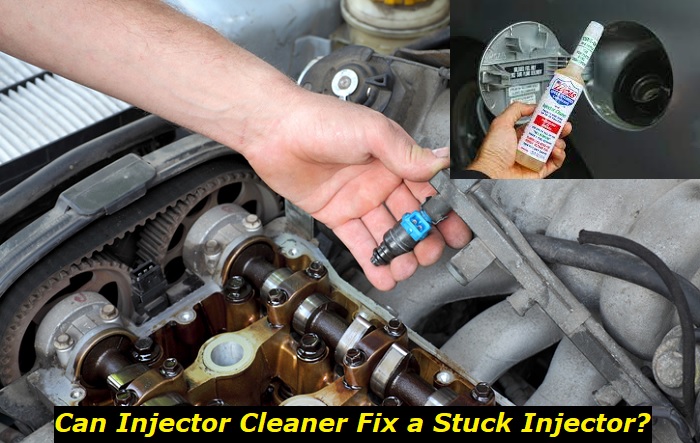One of the most essential parts of your engine is the injector. As the name suggests, it sprays a specific amount of atomized fuel into the combustion chamber, based on the inputs it receives from the ECU. The ECU determines the amount of fuel to be sprayed based on driving conditions and driver input. As such, you can imagine that having any issues with the injectors will affect your car's performance drastically!
Injector cleaning additives highlights
- Efficiency:good if used correctly
- Availability:lots of products and brands
- Average price: $50
- Way to use:spray into the throttle
- DIY use:yes, butmaybe complicated
- Experts' advice:mixed advice
- Independent testing:a lot of positive testing
- Consequences:injector damage ifused incorrectly, exhaust system damage, valve damage

How to Diagnose a Stuck Open Injector? Common Symptoms
Before going on searching for fixes and getting quotes from repair shops for your injectors, you should be able to correctly identify the problem clearly. Having a stuck open fuel injector in your car will present many symptoms, most of which can be confused with many other problems that are not injector-related.
So let us stand back for a second and look for the common symptoms that stuck open injectors can cause in your car.
1) Bad Fuel Economy
One of the telltale signs of having stuck open fuel injectors is that you're getting very poor mileage from your car, way worse than usual numbers. This symptom is pretty self-explanatory, as the injectors are stuck open they will drip more and more fuel into the combustion chamber.
In fact, if it drips too much, the excess fuel will go directly to the exhaust system. This excess fuel can either drip from the exhaust tips directly or can burn at extreme temperatures and cause smoke to come out of your exhaust. More on this later!
2) Bad Engine Performance
Another important sign is the loss of power and the engine running rough during idling and cruising. The reason for this symptom can be varied. Since the fuel injector is stuck open, more than necessary fuel is going to find its way into the combustion chamber. This might cause engine misfiring and in extreme cases, all the fuel in the combustion chamber can even prevent the air-fuel mixture from igniting!
All the fuel will make the spark plugs wet and of course, wet spark plugs aren't going to ignite the mixture. So your car will be running with one cylinder less, as all the unburned air-fuel mixture will be straight going to the exhaust system!
Fortunately, it's very easy to identify whether this issue is caused by a stuck open injector or not. Here are the necessary steps:
- First, start the car and let the engine run on idle for a short while, it doesn't have to be too long, a couple of minutes should just be enough.
- After idling the car, turn it off.
- Remove the spark plugs from all of your cylinders.
- If a spark plug that you've just removed is soaking wet, the injector of that cylinder is probably stuck open and it filled the cylinder with excess fuel!
This test is very easy to do at home and can give you a definitive answer if you're not sure whether you have a stuck open fuel injector or not!
3) Lots of Smoke Coming From the Exhaust
So, the open injector will leak a lot of fuel into the combustion chamber. As we've mentioned before, all that fuel is going to be dumped into the exhaust system. In the exhaust system, a couple of things can happen to this fuel. It can either drip by itself from the tailpipe or earlier if you have a leak in your exhaust system. You will easily notice that you have fuel dripping from your tailpipe and not water, from the smell.
If you're wondering whether having fuel drip out of your tailpipe is normal or not, you can be sure that it definitely isn't normal! All the fuel should be burned during the combustion process and you should never have fuel come out of the tailpipe in a liquid form.
If you keep driving with a stuck open fuel injector, you're going to ruin your catalytic converter which will be a very expensive repair! And, finally, you will have smoke coming out of the exhaust, which is the result of fuel burning in the extreme temperatures of your exhaust system. Even if you somehow miss the smoke coming out of your tailpipes, you will definitely tell that fuel is burning by the smell of gasoline.
Is It Bad to Drive With a Stuck Fuel Injector?
You might think since the car starts and you're able to drive the car, you might be able to keep driving the car until you get the issue fixed. However, doing so is not recommended at all. You might damage the car a lot more and render it inoperable without getting a laundry list of repairs.
As we've mentioned, you will be getting terrible gas mileage and engine misfires, and might even damage the catalytic converter completely, however, the damage caused by this issue can be a lot worse.
A huge amount of fuel in the combustion chamber can cause your engine to hydrolock and completely total your engine, causing you to replace your engine in its entirety or write the car off and send it to a scrapyard. Hydrolocking normally occurs when the car is driven through floods or large bodies of water. Basically, it happens when a large amount of water (or in the case of a stuck open fuel injector, fuel) gets into the combustion chamber and causes the pistons or the connecting rods the bend in the compression phase.
If this happens, the engine will stall violently and you will not be able to start your car again. The only solution will be to change the engine completely, which can cost more than the car is worth!
How to Fix a Stuck Open Fuel Injector?
A fuel injector being stuck open can be caused by many issues, and depending on the root cause the solution will either be replacing them completely or doing repairs elsewhere in the car.
As we mentioned before, gasoline is a solvent and should clean the dust and grime that can potentially end up in a car's injectors. Not only that but also in most countries, fuel is sold with many additives to keep motorist's cars running as smoothly and efficiently as possible.
However, trying out an injector cleaner can be a cheap solution. Most in-tank injector cleaner solutions are designed to not damage the car's engine in any way, and most solutions are quite cheap. It might be worth a try, as they are very cheap however there's no guarantee that they would work for you. At the end of the day, you would only lose a couple of dollars as these solutions are very inexpensive though.
Professional repair shops that specialize in injector repairs, might be able to clean the injectors thoroughly using compressed air or other solutions. However, more often than not, the definite solution is to replace the injectors entirely with a newer one.
For gasoline engines, injectors are designed to be very durable and will not need replacing anytime soon. In other words, you can simply just replace it and forget about it. On the other hand, diesel engines require a lot more frequent replacements of their injectors, as they have to work in much harder conditions with a lot more pressure - figuratively and literally!
If the root cause of the stuck open fuel injector is caused by electrical problems, however, even changing the injector won't fix the issue entirely. The fuel injector can be stuck in its open position because of a damaged ECU, or a damaged wiring harness that controls the injector. In this case, the electrical issue will have to be amended to fix the issue entirely. And this is why, we always recommend you contact professionals who can identify the root cause of the problem and act accordingly.
Final Thoughts
We hope you've found our guide on fixing your stuck open injectors useful! If you found this article useful and were able to fix your car by following the bits of advice we've mentioned, leave a comment below to let us know! And as always, drive safe out there!
About the authors
The CarAraC research team is composed of seasoned auto mechanics and automotive industry professionals, including individuals with advanced degrees and certifications in their field. Our team members boast prestigious credentials, reflecting their extensive knowledge and skills. These qualifications include: IMI: Institute of the Motor Industry, ASE-Certified Master Automobile Technicians; Coventry University, Graduate of MA in Automotive Journalism; Politecnico di Torino, Italy, MS Automotive Engineering; Ss. Cyril and Methodius University in Skopje, Mechanical University in Skopje; TOC Automotive College; DHA Suffa University, Department of Mechanical Engineering






Add comment